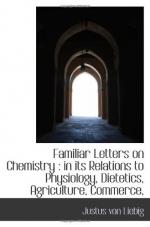It is evident that the supply of the heat lost by cooling is effected by the mutual action of the elements of the food and the inspired oxygen, which combine together. To make use of a familiar, but not on that account a less just illustration, the animal body acts, in this respect, as a furnace, which we supply with fuel. It signifies nothing what intermediate forms food may assume, what changes it may undergo in the body; the last change is uniformly the conversion of its carbon into carbonic acid, and of its hydrogen into water. The unassimilated nitrogen of the food, along with the unburned or unoxidised carbon, is expelled in the urine or in the solid excrements. In order to keep up in the furnace a constant temperature, we must vary the supply of fuel according to the external temperature, that is, according to the supply of oxygen.
In the animal body the food is the fuel; with a proper supply of oxygen we obtain the heat given out during its oxidation or combustion. In winter, when we take exercise in a cold atmosphere, and when consequently the amount of inspired oxygen increases, the necessity for food containing carbon and hydrogen increases in the same ratio; and by gratifying the appetite thus excited, we obtain the most efficient protection against the most piercing cold. A starving man is soon frozen to death. The animals of prey in the arctic regions, as every one knows, far exceed in voracity those of the torrid zone.
In cold and temperate climates, the air, which incessantly strives to consume the body, urges man to laborious efforts in order to furnish the means of resistance to its action, while, in hot climates, the necessity of labour to provide food is far less urgent.
Our clothing is merely an equivalent for a certain amount of food. The more warmly we are clothed the less urgent becomes the appetite for food, because the loss of heat by cooling, and consequently the amount of heat to be supplied by the food, is diminished.
If we were to go naked, like certain savage tribes, or if in hunting or fishing we were exposed to the same degree of cold as the Samoyedes, we should be able with ease to consume 10 lbs. of flesh, and perhaps a dozen of tallow candles into the bargain, daily, as warmly clad travellers have related with astonishment of these people. We should then also be able to take the same quantity of brandy or train oil without bad effects, because the carbon and hydrogen of these substances would only suffice to keep up the equilibrium between the external temperature and that of our bodies.
According to the preceding expositions, the quantity of food is regulated by the number of respirations, by the temperature of the air, and by the amount of heat given off to the surrounding medium.
No isolated fact, apparently opposed to this statement, can affect the truth of this natural law. Without temporary or permanent injury to health, the Neapolitan cannot take more carbon and hydrogen in the shape of food than he expires as carbonic acid and water; and the Esquimaux cannot expire more carbon and hydrogen than he takes in the system as food, unless in a state of disease or of starvation. Let us examine these states a little more closely.




